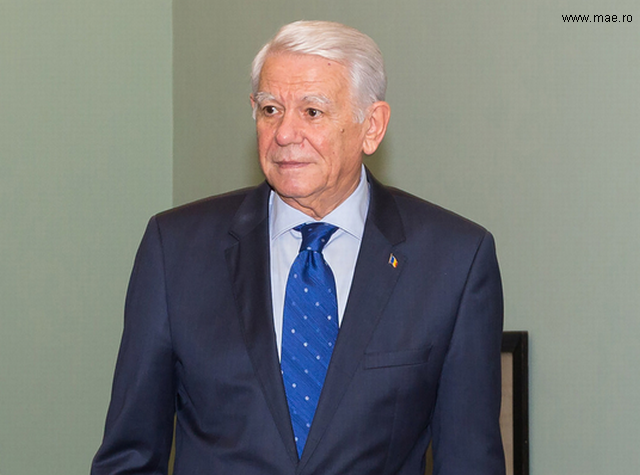Priorities of the Romanian diplomacy (II)
In a comprehensive interview on Radio Romania, the Romanian foreign minister Teodor Melescanu spoke about the priorities of the Romanian foreign policy

Corina Cristea, 22.12.2017, 15:07
After having presented to you some of Romania’s foreign policy priorities, we will now take a look at Romania’s prospects to join the Schengen area and at Bucharest’s relations with Moscow and Chisinau. “In the eastern neighbourhood we are interested in having, as partners, states that are solid institutionally, with security and development prospects that are freely chosen. We are also interested in the future of the Balkans, where we take a strategic interest. We want Romania to become a pillar of the EU’s and NATO’s strategic projections in these neighbouring regions,“ said Minister Melescanu.
Referring to the relations between Romania and the former Soviet Republic of Moldova, with a majority Romanian-speaking population, the Romanian foreign minister spoke about the objective of consolidating them: “We pay special attention to a consistent portfolio of projects with a common direction or idea, namely the connection of the Republic of Moldova to Europe in terms of energy infrastructure, institutions and values. We continue to massively invest in projects meant to modernise the Republic of Moldova, in the welfare of its people, and to support that country follow its European path. In late September we disbursed the last instalments of the 150 million euro loan granted under a reimbursable financial assistance agreement between Romania and the Republic of Moldova, that significantly contributed to assuring Moldova’s financial stability, at the same time taking consistent action for rallying EU support for the Republic of Moldova. Romania endorsed a European Parliament decision of July 4th on a 100 million- Euro- conditioned macro-financial assistance from the EU. Our option for the Republic of Moldova’s European integration is mainly focusing on the idea of coming up with sustainable answers to its citizens’ expectations of prosperity, security and stability.”
Romania will further be a staunch partner of the Republic of Moldova, in its effort to accomplish its European aspirations, Teodor Melescanu added, recalling that in the 2009-2015 period Romania granted 122 million euros in assistance to the Republic of Moldova in several fields such as education, agriculture, civil society, healthcare, boosting administrative capabilities, good governance and the rule of law.
As far as Romania’s relations with Moscow are concerned, Bucharest wants to foster pragmatic and predictable relations, based on general norms and the principles of international law and on reciprocity, Minister Melescanu explained: ”This wish cannot be accomplished without taking into account things that have already happened, such as the illegal annexation of Crimea and the situation in eastern Ukraine. We are concerned about the serious Russian military build-up at our eastern border. The European Union has responded to these evolutions by adopting sanctions, which Romania has associated to and has endorsed. As a NATO member we continue to support the double approach promoted at allied level concerning Russia, which is based, on one side, on defence and strong deterrence, while on the other side on the readiness for pragmatic dialogue based on reciprocity.”
Initially scheduled for March 2011, Romania’s accession to Schengen has not materialized yet.
We have met all the technical accession criteria for quite some time now, but the lack of unanimity at political level has prevented us from reaching this objective, minister Melescanu has explained: “Schengen accession continues to be one of Romania’s top political priorities. At the same time we have to take into account the outcome of the 2015 migrant crisis or the terror attacks in some European countries, which has recently led to a series of measures aimed at consolidating the Schengen area and the EU’s domestic security. From my point of view, a positive decision in this respect would contribute to increasing the EU capability to meet current security challenges, given Romania’s significant expertise in the field.”
According to Melescanu, the essential role Bucharest is playing in the EU’s security architecture is not only a vision of our own, as it has been unanimously recognized and recently reiterated by the European community, and that comes to strengthen Romania’s arguments concerning the added value this country can bring in as a fully-fledged Schengen member state.






























